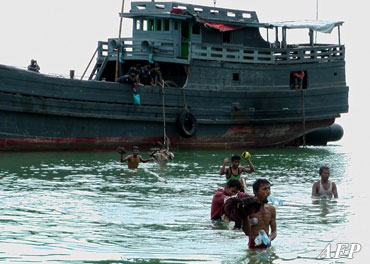Human Rights Watch (HRW) has called on the Thai government to immediately halt its plan to deport 73 ethnic Rohingyas back to Burma.

In a statement on Thursday, the New York-based rights group urged the Thai authorities to allow the United Nations High Commissioner for Refugees (UNHCR) unhindered access to the boatpeople and other migrants from Burma’s restive Rakhine State to determine whether they are seeking asylum and whether they qualify for refugee status.
On January 1, the Thai authorities intercepted a boatload of 73 Rohingya migrants—reportedly including as many as 20 children, some as young as 3—2013, near Bon Island in Phuket province.
“After providing food, water and other supplies to the passengers and refueling the boat, Thai authorities initially planned to push the boat back to sea en route to Malaysia’s Langkawi Island,” said the HRW statement. “When they found that the rickety, overcrowded boat had cracks and that many passengers were too weak to endure a stormy sea voyage, the authorities brought the group ashore to the Phuket Immigration Office. By 4 p.m. on January 2, two trucks with all 73 Rohingya were heading to Ranong province for deportation to Burma.”
According to a report in The Bangkok Post, Phuket Governor Maitri Inthusut said on Wednesday that the 73 Rohingya boatpeople were physically unable to continue their journey by sea to Malaysia, and that all of them would be sent back to Burma by land on transport provided by Thai immigration police.
“The Thai government should scrap its inhumane policy of summarily deporting Rohingya, who have been brutally persecuted in Burma, and honor their right to seek asylum,” said Brad Adams, HRW’s Asia Director. “UNHCR should be permitted to screen all Rohingya arriving in Thailand to identify and assist those seeking refugee status.”
HRW said that the Thai government’s so-called “help on” policy fails to provide Rohingya asylum seekers with protection required under international law, and in some cases increases their risk. It said that, under this policy, the Thai navy is under orders to intercept Rohingya boats that come too close to the Thai coast. “Upon intercepting a boat, officials provide the boat with fuel, food, water, and other supplies on condition that the boats sail onward to Malaysia or Indonesia. All passengers must remain on their own boats during the re-supply,” the statement said.
HRW said that often, if the Thai authorities find a boat to be unsafe, they will deport the Rohingya by land, frequently at border crossings such as Ranong in southern Thailand where people smugglers await deported Rohingya to exact exorbitant fees to transport them to Malaysia. “Those unable to pay the smuggling fees are forced into labor to pay off the fees, condemning them to situations amounting to human trafficking,” the statement said.
“Thailand has repeatedly stated its commitment to combat human trafficking, yet by deporting Rohingya into the hands of people smugglers, they are making them vulnerable to trafficking,” Adams added.


